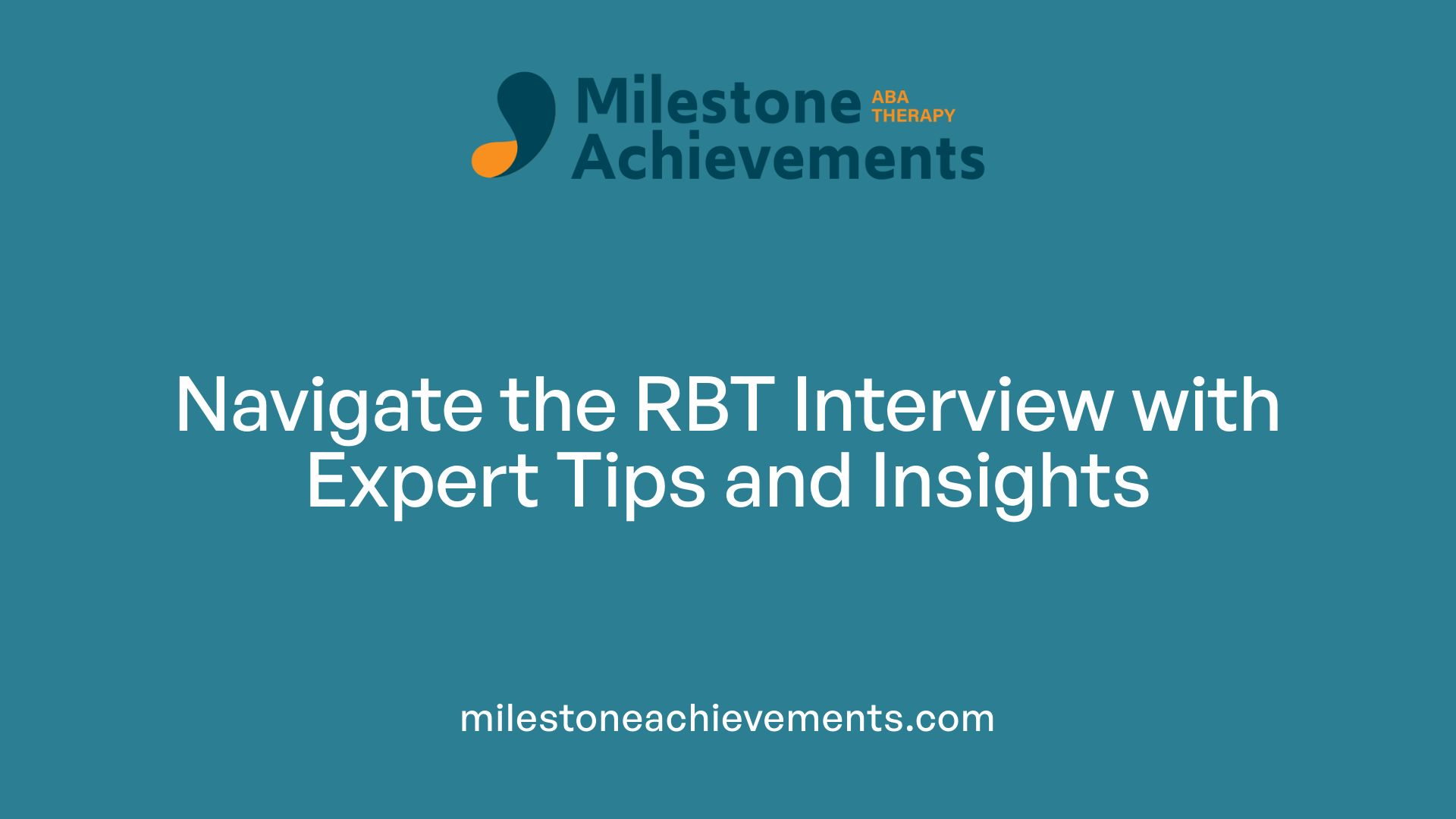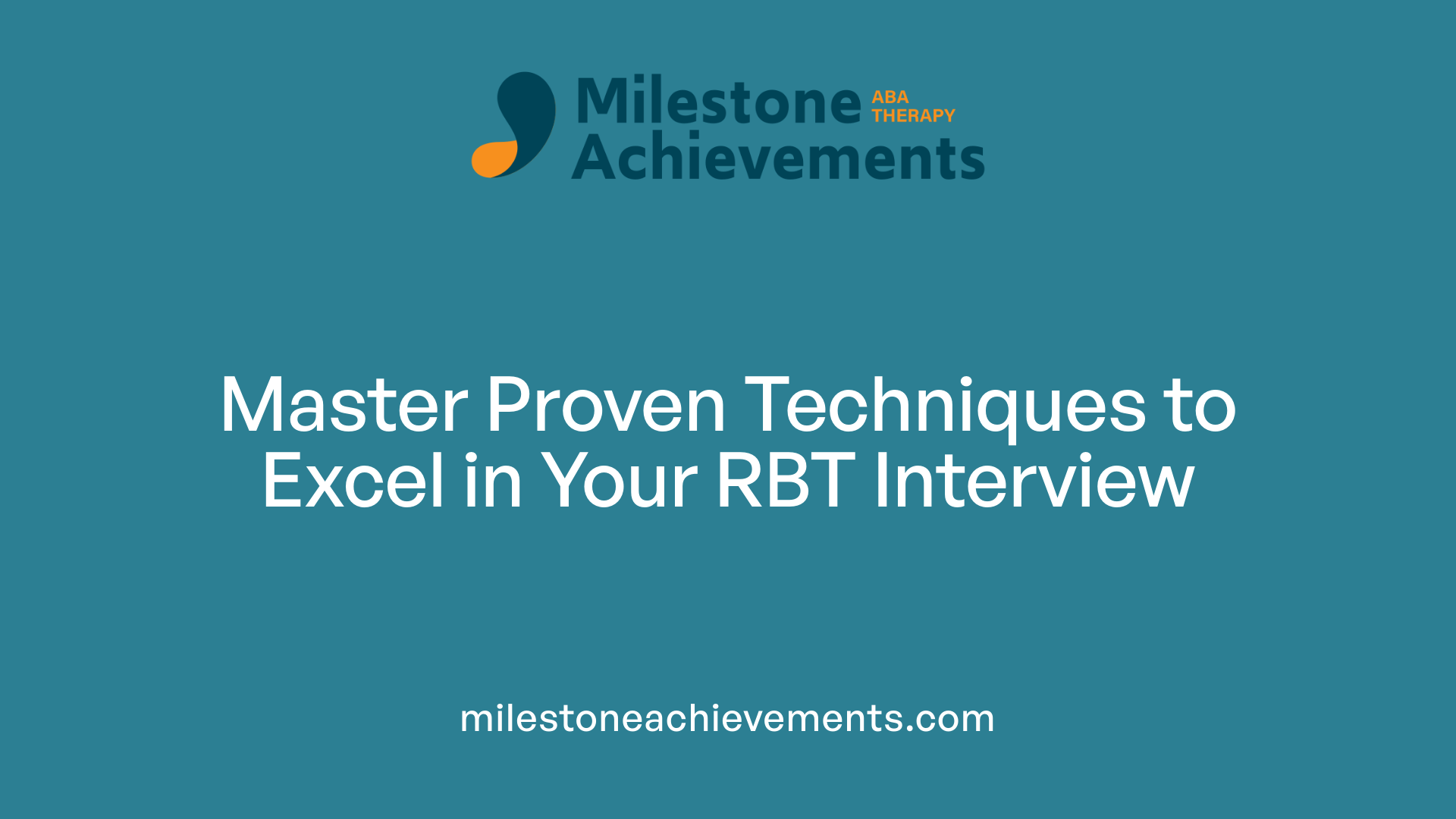
Common Interview Questions for RBT Positions
Mastering Your RBT Interview: Essential Insights and Preparation Tips
Navigating the Path to a Registered Behavior Technician Role
Landing a position as an RBT involves understanding the interview process, preparing effectively, and demonstrating your knowledge of ABA principles and practical skills. This comprehensive guide covers common questions, how to prepare, and strategies to showcase your suitability for the role.
Understanding the RBT Interview Process

What is the interview process like for RBT roles?
Getting started as a Registered Behavior Technician (RBT) involves a comprehensive interview process designed to assess your skills, experience, and fit for working with children who have behavioral challenges, including autism and other disabilities. This process typically begins with an initial screening, where the employer reviews your resume and application to see if your background aligns with the role.
Following this, candidates are usually asked behavioral interview questions. These questions aim to understand how you approach typical scenarios, such as handling challenging behaviors or teaching new skills. Employers may inquire about your experience with reinforcement techniques like praise, token systems, or physical gestures like high fives, as well as how you have used these tools in practice.
In addition, some organizations include skills assessments or scenario-based questions. These exercises evaluate your practical knowledge of ABA principles, data collection methods, and your problem-solving skills in real-time situations. For example, you might be asked to explain how you would handle aggressive behaviors by redirecting or employing communication aids.
Preparing for the interview involves researching the organization thoroughly. Understanding their approach to therapy, client demographics, and team structure will help you tailor your responses. Candidates should be ready to discuss their supervised hours, training procedures, and their path to certification as an RBT.
During the process, it’s also important to show enthusiasm for supporting children and working collaboratively with treatment teams. Demonstrating your knowledge of ABA, your commitment to ongoing supervision, and your ability to work under guidance can greatly improve your chances of securing the position.
Candidates should have thoughtful questions prepared about supervision practices, training programs, and career advancement opportunities. Asking these questions shows genuine interest and helps you understand if the organization’s values align with your professional goals.
Overall, the RBT interview is a chance to showcase your clinical understanding, your passion for working with children with disabilities, and your readiness to contribute to a team-based treatment approach. Success depends on thorough preparation, clear communication, and a demonstrated understanding of behavior intervention strategies.
Comprehensive Preparation Strategies for RBT Interviews
How should I prepare for an RBT interview?
Preparing effectively for a Registered Behavior Technician (RBT) interview involves a systematic approach to understanding both the technical requirements and the organizational culture. First, review the Behavior Analyst Certification Board (BACB) RBT Task List thoroughly. This list outlines essential tasks and knowledge areas, including reinforcement strategies, data collection methods, behavior reduction techniques, and crisis management.
Next, deepen your understanding of Applied Behavior Analysis (ABA) principles. Focus on core concepts such as reinforcement, prompting, extinction, and data documentation. Familiarity with different reinforcement techniques like praise, token systems, and physical gestures like high fives will showcase your practical skills.
Research the specific organization conducting the interview. Learn about its mission, values, and the specific client population it serves—whether children with autism, other developmental disabilities, or behavioral challenges. This knowledge helps tailor your responses and demonstrate genuine interest.
Practicing common interview questions is crucial. Use the STAR method (Situation, Task, Action, Result) to craft clear, impactful answers. For example, describe a situation where you successfully managed challenging behaviors or collaborated with a team to implement a behavior plan. Highlight your experience with supervised hours, certifications, and ongoing training.
Preparing a professional portfolio is also recommended. Include examples of data sheets, behavior intervention plans, progress reports, and positive outcomes you've contributed to. This tangible evidence underscores your competence and readiness.
Additionally, focus on presentation and professionalism. Choose appropriate attire, arrive early to allow for any unforeseen delays, and maintain a calm, confident demeanor during the interview. Following up with a thank-you note can leave a positive impression and show your enthusiasm for the role.
By systematically covering these areas, candidates will be well-equipped to demonstrate their knowledge, skills, and dedication to supporting individuals with disabilities.
Below is a summary table to help organize your preparation steps:
| Preparation Step | Details | Purpose |
|---|---|---|
| Review BACB RBT Task List | Understand essential tasks and knowledge areas | Ensures familiarity with core responsibilities |
| Study ABA principles | Reinforcement, prompting, data collection | Demonstrates technical competence |
| Research organization | Mission, client types, values | Tailors responses and shows genuine interest |
| Practice interview questions | Using STAR method | Builds confidence and clarity |
| Prepare a portfolio | Data sheets, behavior plans, outcomes | Provides tangible evidence of skills |
| Professional presentation | Dress well, early arrival | Creates a positive first impression |
| Follow-up | Thank-you note | Reinforces enthusiasm and professionalism |
Focusing on these strategies will enhance your readiness and increase your chances of success in the RBT interview process.
Key Questions Typically Asked in RBT Interviews
What are some common interview questions for RBT positions?
When applying for a Registered Behavior Technician (RBT) role, candidates can expect a variety of questions designed to assess their knowledge, experience, and fit for the position. These questions range from behavioral and technical topics to personal motivation and teamwork skills.
One of the main areas of focus is experience with behavioral interventions. Interviewers want to understand the candidate’s hands-on experience with techniques such as praise, token systems, and other reinforcement strategies. They may ask about specific activities, like data collection for Individualized Education Programs (IEPs), and how these activities were used to track progress.
Understanding of Applied Behavior Analysis (ABA) principles is also crucial. Candidates should be prepared to discuss fundamental concepts, how they’ve applied them in real situations, and their familiarity with behavior management techniques like redirecting challenging behaviors, ignoring disruptive actions, or using communication aids.
Handling difficult or aggressive behaviors is a critical topic. Candidates might be asked to describe methods they’ve used or would use, such as redirecting a child’s attention, employing communication devices, or effectively de-escalating crisis situations.
Behavioral interview questions often include situational prompts designed to assess traits like patience, empathy, and cultural sensitivity. For example, an interviewer might ask how a candidate would respond if a child refuses to comply with an instruction or becomes upset during therapy.
Technical questions may evaluate knowledge around reinforcement, data collection, and behavior intervention plans. Candidates should be ready to explain how they record progress, analyze data, and adapt strategies accordingly.
Candidates also need to discuss their motivation for becoming an RBT and their readiness to work within a team. Most roles involve collaboration with speech therapists, occupational therapists, teachers, and parents, so demonstrating teamwork skills is essential.
Preparation tips include reviewing ABA concepts, practicing responses to common questions, and possibly role-playing scenarios. Some candidates find it helpful to prepare examples of past experiences where they've successfully managed difficult behaviors or contributed effectively to a team.
In summary, RBT interview questions cover a broad range of topics focused on clinical skills, personal traits, and professional motivation. Proper preparation can not only help candidates articulate their strengths but also demonstrate their commitment to supporting individuals with disabilities effectively.
Effective Strategies for Answering RBT Interview Questions

How can I best prepare to answer common interview questions for an RBT role?
Preparing for an RBT interview involves understanding the core competencies required for the role, including knowledge of Applied Behavior Analysis (ABA) principles, experience with behavioral interventions, and skills in data collection and team collaboration. It is helpful to review typical questions, such as those about handling challenging behaviors, teaching new skills, and collaborating with team members. Practicing clear, concise answers that include specific examples from your experience can make your responses more compelling.
What approach can I use to structure my responses effectively?
Using the STAR method—Situation, Task, Action, Result—is an excellent way to craft well-organized responses. For each question, describe the context, explain your role or what was needed, detail your actions, and share the outcomes. This approach ensures your answers are thorough and demonstrate your problem-solving skills and practical experience.
How should I highlight my knowledge and skills related to ABA?
To showcase your ABA knowledge, be prepared to discuss specific reinforcement techniques you have used, like praise, token systems, or high fives. Share examples of how you've implemented strategies such as data collection for Individualized Education Plans (IEPs), worked on skill acquisition, or managed behaviors like aggression through methods like redirection or using communication aids. Demonstrating your understanding of these strategies shows your readiness for the role.
What soft skills should I demonstrate during the interview?
Soft skills are critically important in behavior intervention work. Highlight your patience, communication, teamwork, and ability to handle stressful situations professionally. Share instances where these skills helped you effectively manage behaviors or collaborate with treatment team members, like teachers or psychologists.
How can I prepare for behavioral and situational questions?
Practice answering questions that ask you to describe past experiences or imagine scenarios. For example, be ready to discuss how you would handle an escalated tantrum or teach a new skill. Role-playing with a friend or mentor can boost your confidence and clarity. Think about situations where you successfully used data, communication, or innovative strategies.
What should I ask the interviewers?
Prepare thoughtful questions that demonstrate your interest in the position and your proactive attitude. Questions can include inquiries about team structure, supervision processes, ongoing training opportunities, or how success is measured in the role. Asking questions shows your engagement and helps you understand the expectations of the role.
How can I effectively communicate my supervised hours and training background?
Be ready to clearly state your total supervised hours, the types of experiences you've gained, and any specific training you've undergone, including certification processes. Mention your familiarity with ongoing supervision and continuing education, emphasizing your commitment to ethical and effective practice.
What are some common questions related to handling behaviors and skills development?
Candidates are often asked about their experience with managing challenging behaviors, including the techniques they employed. Be prepared to discuss specific strategies like ignoring, redirection, or the use of communication aids. Also, share how you approach teaching new skills, from planning to execution, and how you collaborate with other team members to ensure the best outcomes.
Summarizing essential tips for responding effectively
In summary, effective responses to RBT interview questions involve structured storytelling using the STAR method, demonstrating both technical ABA skills and soft skills, and showing a genuine understanding of the role's demands. By practicing your answers, researching the organization, and preparing thoughtful questions, you can leave a positive impression and increase your chances of success.
| Area of Focus | Example Questions | Tips for Response | Additional Notes |
|---|---|---|---|
| Personal Background | Tell us about your background | Highlight relevant experience and motivation | Link personal story with passion for ABA |
| Interest in ABA | Why do you want to be an RBT? | Share your understanding of ABA benefits | Demonstrate enthusiasm |
| Handling Challenging Behaviors | How do you manage aggression? | Discuss specific techniques like redirection | Emphasize safety and communication |
| Teaching Skills | How would you teach a new skill? | Use step-by-step approach | Include data collection and feedback |
| Collaboration | Describe your teamwork experience | Mention working with treatment teams | Focus on communication and coordination |
| Supervised Hours & Training | How have your hours prepared you? | Be specific about hours and experiences | Show ongoing professional development |
| Ethical Practice | How do you handle confidentiality? | Explain adherence to ethical standards | Mention continuous education |
By adhering to these strategies, you can approach your RBT interview with confidence and clarity, effectively showcasing your readiness to contribute to behavioral health teams.
The Importance of Practical Experience and Supervision Knowledge

What should I discuss regarding supervised hours and training?
Candidates preparing for an RBT interview should be ready to talk about their supervised hours and the training process they have undergone. This includes explaining how they obtained their RBT certification, the steps involved in training, and the requirements for ongoing supervision.
It's vital to highlight your hands-on experience with clients, such as conducting data collection, implementing behavior intervention plans, and working directly with children with disabilities like autism. Sharing specific examples of your work demonstrates your practical skills and your familiarity with ABA techniques.
Discuss your training procedures, including how you completed initial coursework, supervised fieldwork, and any continuing education or supervision activities. Be prepared to describe how you stay compliant with certification standards, such as tracking supervised hours and participating in ongoing supervision sessions.
Understanding the importance of regular supervision and professional development is crucial. Emphasize your commitment to maintaining ethical standards and your dedication to refining your skills through supervision. This shows employers your proactive approach toward growth within the ABA field.
Aligning Your Motivation with the RBT Role

What motivates candidates to pursue an RBT position?
Candidates interested in becoming Registered Behavior Technicians (RBTs) are often driven by a deep desire to support individuals with developmental disabilities, such as autism spectrum disorder. This motivation stems from a genuine passion for helping others and a strong commitment to making a meaningful difference in their lives.
Many candidates find fulfillment in using Applied Behavior Analysis (ABA) techniques to promote skill acquisition and decrease problematic behaviors. Their enthusiasm for fostering positive change in their clients' lives motivates them to pursue this career path with dedication.
Additionally, a commitment to ethical practices and continuous professional growth plays an important role in why candidates choose to become RBTs. They understand the importance of ongoing training, supervision, and collaboration with treatment teams to ensure best outcomes.
Expressing genuine enthusiasm for supporting clients and a dedicated interest in ABA during an interview can significantly enhance a candidate's profile. Demonstrating how their passion aligns with the role underscores their readiness and dedication to the responsibilities of an RBT.
How does passion for supporting clients influence a candidate's fit?
A strong passion for helping clients highlights a candidate's empathetic nature and persistence. These qualities are essential when dealing with children with autism or other disabilities, especially when implementing reinforcement strategies like praise, token systems, or high fives.
Candidates who are emotionally invested are more likely to approach challenging behaviors such as aggression with patience and effective techniques like redirection or communication aids. This dedication enhances their ability to work collaboratively with treatment teams and foster a supportive environment for clients.
Commitment to ABA principles and ongoing learning
A willingness to stay updated on new ABA research, techniques, and ethical standards shows a genuine commitment to the profession. Candidates often discuss their plans for continuing education, obtaining supervision hours, and maintaining certification to demonstrate their proactive approach.
Such dedication reflects a long-term vision for growth within the field, which reassures employers of a candidate's stability and passion.
| Aspect | Details | Importance |
|---|---|---|
| Motivation Type | Desire to support clients, especially children with autism | Drives dedication and initial interest |
| Reinforcement Techniques Used | Praise, token systems, high fives | Shows understanding and application of ABA methods |
| Experience | Data collection, collaboration, teaching strategies | Highlights practical skills and teamwork |
| Handling Challenging Behaviors | Ignoring, redirecting, communication aids | Demonstrates competency in managing difficult behaviors |
| Continuous Development | Training, supervision, ongoing learning | Reflects commitment to professional growth |
When preparing for an interview, illustrating how your motivation aligns with the core values of ABA and the role of an RBT is essential. Passionate, committed candidates who openly discuss their enthusiasm and ongoing professional development stand out in the competitive landscape of behavior technician roles.
Summarizing Your Strengths, Weaknesses, and Ethical Practice

How should I discuss my strengths, weaknesses, and ethical considerations?
When preparing for your RBT interview, it’s important to showcase attributes that align with the demands of the role. Start by highlighting strengths such as patience, empathy, clear communication, and flexibility. These qualities are crucial when working with children with disabilities, especially in implementing behavioral plans and adapting strategies to individual needs.
Concerning weaknesses, honesty is vital. Be upfront about areas where you seek growth, but frame these as opportunities for development. For example, you might mention working on advanced data collection techniques or seeking additional certification courses. This demonstrates self-awareness and a proactive approach to professional improvement.
Ethical considerations form the backbone of effective practice. Discuss your understanding of client confidentiality, the importance of maintaining professional boundaries, and adherence to the Behavior Analyst Certification Board (BACB) guidelines. Emphasize your commitment to ethical decision-making and ongoing education in the field.
Overall, embodying a growth mindset, being self-reflective, and valuing ethical practice will help you present a well-rounded and competent profile during your interview.
Preparing for Success in Your RBT Interview
Approaching your RBT interview with thorough preparation, genuine enthusiasm, and a solid understanding of ABA principles will position you for success. Remember to showcase your practical experience, soft skills, and commitment to ethical practice. Asking insightful questions about supervision, training, and career growth demonstrates your serious interest in the role. With diligent preparation and confident delivery, you can confidently navigate the interview process and take a significant step forward in your ABA career.
References
- Possible Interview Questions (RBT) Flashcards - Quizlet
- Registered Behavior Technician Interview Questions & Answers
- ABA Therapy Interviews: Top Questions and Advice from BCBAs
- How to Prepare For Your First RBT Job Interview
- RBT Interview: Questions and Answers, Tips, Strategies - Astra ABA
- Interview Preparation for RBTs - 40 Hour RBT® Online Training
- School Behavior Specialist (BCBA, RBT, ABA) Interview Questions ...
- Registered Behavior Technician Interview Questions & Answers
- School Behavior Specialist (BCBA, RBT, ABA) Interview Questions ...


Partner with us on your child's journey
Milestone Achievements offers evidence-based ABA therapy to help children with autism reach their full potential. Together we’ll set meaningful goals and celebrate progress every step of the way.
Start ABA Services Today


